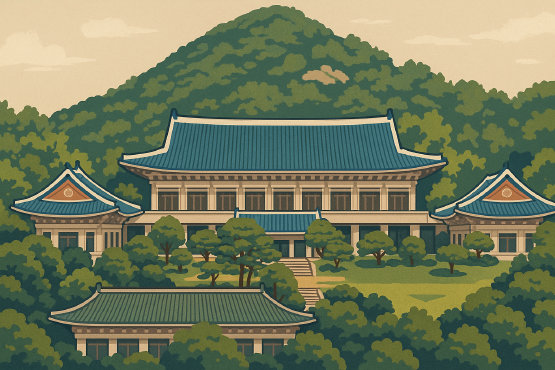The Meaning of Returning to the Blue House: Space and Power in Korean Political Change
The Authority and Identity of Space
In modern society, 'space' is not just a physical location. Space is a structure that embodies political symbolism, social memory, and collective identity, serving as a medium that comprehensively reveals the methods of governance and the philosophy of the state. In particular, the central space of a nation has functioned as a place that visualizes historical recognition and the relationship with its people. In Korean society, the Blue House has held such meaningful significance.
Criticism of the Opening of the Blue House: The Deconstruction of Symbols and the Erosion of Order
The Blue House is not only the presidential working space but also a manifestation of national authority and a symbol of the continuity of governance. Just like the White House or the Élysée Palace, the Blue House is a symbolic place where the spirit of national leadership is realized, serving as a stage that visually represents the integration of the people and the diplomatic stature of the nation. However, as this space has been opened to the general public, the center of governance has become an object of everyday consumption, and the symbolic weight carried by the heart of the nation has diminished. Although the opening was justified in the name of 'communication with the people', it has actually worked to dilute the historical significance and solemnity of the space. As the status of the working space became ambiguous and the symbols of national leadership became dispersed, the shared image of authority experienced a kind of void.
President Lee Jae-myung's Return to the Blue House: Restoration of Space, Reestablishment of Order
In this context, President Lee Jae-myung's return to the Blue House can be understood not merely as a spatial relocation, but as a political decision aimed at restoring symbolism and order. This is an attempt to provide the public with a sense of stability and to reaffirm the continuity and identity of state governance through space. Of course, there may be arguments that the essence of governance is not in space but in spirit. However, space visualizes and materializes that spirit, serving as a form through which the public and the state share authority. The public experiences the center of the nation through 'where the president is working,' and this becomes an important element providing symbolic stability. The return to the Blue House is also an expression of the will to inherit the history, memories, and traditions accumulated in that space. The Blue House has been the site of numerous diplomatic negotiations, security meetings, and national crisis responses, and the layers of those times have shaped the symbolism of the space. The fact that the president will again reside in this space is a choice to practice a politics of inheritance rather than rupture, and a politics of responsibility rather than whim.
Symbolism of Space and Political Order
Space acquires meaning through time, action, and memory. The Blue House is not merely an architectural structure, but a political stage that encapsulates the growth of South Korea, the pains of democracy, crises, and the processes of overcoming them. A disconnection from this stage would interrupt the continuity of memory and could result in a fainting of the image of state authority that is embedded in the unconscious of the people. The return of the Blue House under the Yoon Seok-youl administration is a decision to once again respect the symbolism and historicity of this space. This is not a regression to the past, but a progressive choice aimed at re-establishing order for the future through the space, and designing integration and responsibility.
Conclusion: Space is not just a background
Space speaks without words. Humans remember, recognize authority, and become aware as members of a community within space. The Blue House was a space with such meaning. The decision to treat it merely as an 'object of openness' weakened the symbolism of the space and the order of governance, while, conversely, President Lee Jae-myung's return was an expression of the will to restore authority, order, history, and identity through space. Now, we need to reflect on space once again. Space is not merely a stage for functions it is a place where identity and the memories of the community are concentrated. When we read and respect this meaning deeply, space transcends being a simple backdrop and becomes the center that connects the community. The Blue House should serve as that center and become the foundation for the order and integration that South Korean society will design in the future.

Post a Comment